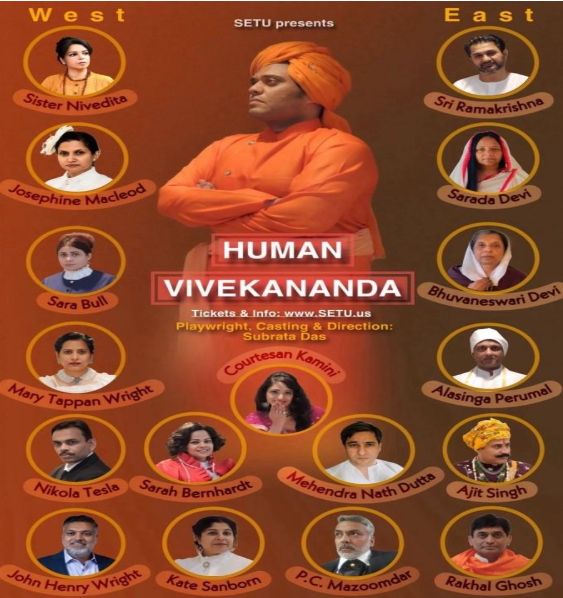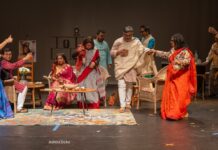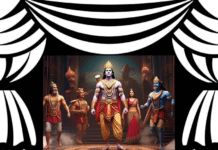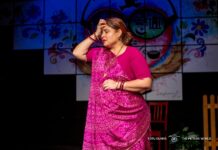By Ronita Panda
BOSTON–Spirituality touches lives in diverse ways. Some are naturally drawn to it, others adopt its practices gradually, and some, later in life, devote themselves more fully to the quest for meaning. Within SETU Community Theatre, our members span this spectrum, from worldly pleasures and the theatrically indulgent to those seeking deeper philosophical understanding. Playwright and director, Subrata Das, thinks in India “we often deify spiritual figures once they attain a certain level of perceived enlightenment. We begin to ascribe supernatural powers to them, overlooking their human struggles, vulnerabilities, and the non-religious aspect of the philosophical depth of their teachings.” It is in this spirit of exploration that we embark on our next production: Humanizing Vivekananda.
Swami Vivekananda, revered worldwide for his intellect, charisma, and spiritual depth, is often portrayed as a flawless figure, an icon beyond reproach. Yet, to understand his human essence is to acknowledge his flaws alongside his brilliance. Our production seeks to illuminate both: the revered guru and the man behind the pedestal. As the curtain rises on our upcoming play chronicling Swami Vivekananda’s transformative years in the West, it’s essential to revisit the remarkable early life that shaped this global spiritual icon.
Born as Narendranath Datta, on January 12, 1863, in Kolkata (then Calcutta), Swami Vivekananda, lovingly called Naren, was raised in a culturally rich and intellectually vibrant household. His father, Vishwanath Datta, was a well-read attorney fluent in Persian and English, whose rationalism and progressive thinking influenced young Narendra’s logical mind. In contrast, his mother, Bhuvaneshwari Devi, was deeply religious and spiritually inclined, known for her storytelling and devout practices. From her, he inherited his deep compassion and spiritual intuition.
An interesting yet often overlooked aspect of his early life was his relationship with his siblings. Growing up in a large joint family, Narendra developed leadership qualities and resilience amidst the playful chaos of his brothers and sisters. His early sense of justice and protectiveness towards the underprivileged emerged from this dynamic domestic setting.
Brilliant and inquisitive from a young age, he was shaped by a loving yet complex family dynamic, and by formative friendships with figures such as Rakhal Ghosh and Alasinga Perumal. He was drawn to Western philosophy, literature, and science during his education at the Scottish Church College, while simultaneously seeking answers to deeper spiritual questions. This inner unrest led him to the mystic Sri Ramakrishna Paramahamsa at the Dakshineswar Kali Temple. Initially skeptical of the saint’s unconventional spiritual experiences, Narendra eventually became his most devoted disciple. His spiritual trajectory was profoundly altered by his encounter with Sri Ramakrishna, whose teachings became the foundation of his life. Alongside Sarada Devi, the “Holy Mother,” and other contemporaries such as P.C. Mozoomdar and Bhuvaneswari Devi, Vivekananda developed a vision that would transcend India’s borders.
After Ramakrishna’s death in 1886, Narendra, known popularly as Swami Vivekananda, renounced worldly life at the age of 25 and embraced the monastic path.
He would go on to captivate the world with his message of Vedanta, unity of religions, and service to humanity, most famously at the 1893 Parliament of the World’s Religions in Chicago, where his opening words, “Sisters and Brothers of America,” earned him a standing ovation and global acclaim. His journeys to the West in the were nothing short of revolutionary. His speech earned him followers among the educated, affluent, and even avant-garde Western women. Figures like Sister Nivedita, Josephine Macleod, Sara Bull, and Mary Tappan Wright became part of his circle, helping establish Vedanta societies and providing much-needed support for his global mission. His lectures attracted the attention of luminaries from Nikola Tesla to Sarah Bernhardt, and even engaged Western academics like John Henry Wright, highlighting his extraordinary ability to communicate Eastern philosophy to a global audience.
Swami Vivekananda masterfully blended spiritual insight with exceptional diplomatic skills to advance his mission of spreading Vedanta and interfaith understanding across the globe. At the 1893 Parliament of the World’s Religions in Chicago, his respectful tone, strategic choice of words, and deep cultural awareness disarmed prejudice and won widespread admiration. Rather than confronting Western ideologies head-on, he skillfully highlighted the universal values shared between Eastern and Western traditions, positioning Hindu philosophy as both ancient and relevant. Through calm confidence and respectful dialogue, he opened minds, making him not just a spiritual teacher but a cultural ambassador of rare finesse. He famously declared, “I am proud to belong to a religion which has taught the world both tolerance and universal acceptance. We believe not only in universal toleration, but we accept all religions as true.” This belief in the unity of all religions was central to his mission, helping him to build bridges between the East and the West, and offering a counterpoint to the religious dogmatism of the time.
One of Vivekananda’s most enduring legacies is his passionate advocacy for the education and empowerment of women. He argued that the key to India’s progress lay in uplifting the status of women, a sentiment he expressed with great clarity in his writings and speeches.
On the importance of women’s education, Vivekananda declared, “There is no chance for the welfare of the world unless the condition of women is improved.” One of the most vivid illustrations of his philosophy can be found in his analogy of a bird with two wings: “It is not possible for a bird to fly on only one wing.” He believed that the empowerment of women was essential for the prosperity of the entire society, stating, “Educate your women first and leave them to themselves; then they will tell you what reforms are necessary for them.” His vision was one of a society where women were not just passive recipients of change, but active agents in shaping it.
He also had a unique perspective on the role of women in society, seeing them as the creators of society and the teachers of future generations. “In the West, they have solved the woman question by allowing women to become the companions of men. Here, in India, the ideal is motherhood,” he noted, emphasizing the sacred role of women in shaping both family and society. He often said that India’s progress depended not just on economic reforms but on the restoration of women to their rightful place, where they could actively contribute to the development of the nation.
Vivekananda believed that empowering women meant giving them the education and opportunities to stand on their own feet. He stated, “The woman is the real builder of the nation. It is she who builds the future of a country by giving birth to the next generation.” This belief led him to advocate for the education of women in fields that would benefit both themselves and society, science, literature, philosophy, and beyond. He championed women’s participation in all areas of public life, including administration and governance, and encouraged them to solve their own problems independently without undue interference.
For Vivekananda, this represented the necessity of both men and women working together for the progress of society. Women’s education, he argued, was the key to unlocking a nation’s potential. As he said in his writings, “Women’s education is the foundation of the future. Without the upliftment of women, no society can progress.”
In a society still dominated by outdated traditions like Sati, Vivekananda was a bold advocate for reform. He condemned such practices as barbaric, arguing that India could only move forward if it discarded these harmful customs and embraced a new era of social justice.
Vivekananda’s progressive ideas about women extended into his personal life. He ensured that his own sisters received an education far beyond the norm for women of that time, empowering them to think critically and independently. He believed that women were not only equal to men but could surpass them in many ways if given the right opportunities. His support for women in his personal life mirrored his public advocacy, making him one of the early pioneers of gender equality in India.
However, as we explore his journey, we must confront not just Vivekananda’s triumphs but also the contradictions and controversies surrounding his legacy. Among the key tensions in his life was his portrayal of women, particularly his often stated admiration for fair-skinned women, which has been seen by many as problematic. His letters and writings reveal an unsettling emphasis on the aesthetic and intellectual beauty of “white women,” with quotes suggesting his fascination: “The American women are very beautiful” and “even the prettiest woman of our country will look like a black owl there.” These remarks reflect the deeply entrenched colonial mindset of his time, revealing a man who, despite his philosophical depth, was not immune to the prevailing prejudices of his era.
Moreover, the mystical and occult practices that Vivekananda endorsed have been critiqued in both India and the West. Notably, his involvement in “Raja Yoga” was often accused of causing physical and mental strain among his followers.
In the backdrop of these conflicts was Vivekananda’s time spent in Greater Boston, a region that would later become a hub for spiritual seekers and intellectuals. He visited numerous places in the area, including Harvard University, where he mingled with academics and enlightened minds. Boston’s rich literary and intellectual scene, home to figures like William James, helped shape Vivekananda’s own views on psychology and human consciousness. It was in this milieu that Vivekananda’s message gained traction among the educated elite, who were captivated not only by his wisdom but also by his compelling presence. It is this connection to Boston that the SETU Theatre aims to highlight, showing that this city, a cultural crucible, played a pivotal role in shaping the spiritual path of one of India’s greatest spiritual leaders.
A key figure in the American Vedanta community was Sara Bull, who played a crucial role in supporting Vivekananda’s work in the West. Her home in Cambridge became a center for his followers, and her substantial financial contributions helped establish the Vedanta Society of Boston. The property she left behind was later used to expand the mission of Vedanta, and her legacy continues to influence the spiritual landscape today. Sara Bull, while a devoted disciple and philanthropist, was also accused of suffering from occult practices attributed to Vivekananda’s influence.
However, Vivekananda’s legacy was also marred by criticism, especially regarding his relationships with women. While his relationship with figures like Sara Bull was one of deep admiration and respect, his views on women in general were sometimes dismissive and paternalistic. He was criticized for his apparent misogyny and for upholding a hierarchical, often unequal, relationship between the sexes. This complexity, too, will be examined in our production, as we seek to present a nuanced understanding of his character.
As we explore the life of Swami Vivekananda, we also turn to his spiritual mother, Sarada Devi, and his adopted mother, Sara Bull, both of whom shaped him profoundly. The love and devotion he experienced from Sarada Devi, alongside the nurturing presence of Sara Bull, influenced his approach to spirituality, his understanding of the world, and his ability to inspire others.
Sadly, his journey was brief yet impactful. Swami Vivekananda passed away at the young age of 39 on July 4, 1902, at Belur Math near Kolkata. Despite his early death, his legacy flourished through the Vedanta Societies he inspired, which continue to spread his teachings on universalism, selfless service, and the divinity of the soul.
Today, the Ramakrishna Mission and Vedanta Society operate over 200 centers worldwide across India, the U.S., Europe, Africa, and Asia, with millions of followers globally. These institutions run educational, medical, and spiritual programs, carrying forward Swami Vivekananda’s vision of harmony, empowerment, and enlightenment.
As we bring Swami Vivekananda’s journey to life on stage, we honor not just a remarkable individual, but a transformative movement that reshaped global spirituality. Central to Vivekananda’s teachings was his deep reverence for all faiths. He believed that every religion, at its core, pointed toward the same universal truth, that all paths to the divine are equally valid.
Following the success of our last production “When Gandhi Meets Mohammed (GAM),” a poignant interfaith love story, SETU continues its tradition of thought-provoking theatrical experiences. This new dramatic reading revisits the timeless wisdom of a spiritual leader whose charisma and enlightening insights continue to inspire generations. Through this performance, SETU invites audiences to reflect on the power of unity, compassion, and spiritual harmony in a divided world.
Additionally, in portraying these elements, Humanizing Vivekananda invites audiences to witness the man behind the legend: flawed, passionate, and visionary. By exploring both his shortcomings and extraordinary contributions, SETU Community Theatre hopes to spark reflection on the ways one human life can inspire global consciousness, bridge cultures, and ignite devotion in countless hearts. Ultimately, this production will emphasize the unique historical and personal connection between Vivekananda and his influence in the West, specifically USA and more so, in the Greater Boston region that our SETU community now calls home, showcasing the profound impact he had on the local spiritual community, particularly among Indian Americans and those connected to SETU’s mission.
Please join us to witness the inspiring journey of Swami Vivekananda – from his early struggles and meeting with Ramakrishna, to his iconic Chicago address, Vedantic teachings on non-dualism, and exchanges with disciples like Nivedita and Nikola Tesla.
A strong DOUBLE CAST will bring 14 characters to life.
Registration link: https://www.tickettailor.com/events/stageensembletheatreunit/1783337
SHOW TIMES
Sat, Sep 27, 3pm (Cast ADVAITA)
Sun, Sep 28, 3pm (Cast VEDANTA)
VENUE: Unitarian Universalist Church (Follen), 755 Massachusetts Ave, Lexington, MA 02420
Poster: 𝐌𝐚𝐧𝐢𝐬𝐡 𝐃𝐡𝐚𝐥𝐥
Media Publicity: 𝗦𝗺𝗿𝗶𝘁𝗶 𝗝𝗮𝘆𝗮𝗸𝘂𝗺𝗮𝗿, 𝗡𝗶𝗿𝗺𝗮𝗹 𝗞𝘂𝗺𝗮𝗿, Ronita Panda, Rahul Nair, and Dipali Trivedi
Lights and Sound: 𝗗𝗲𝘃𝗲𝗻 𝗔𝘁𝗻𝗼𝗼𝗿, 𝗣𝗿𝗮𝘁𝗲𝗲𝗸 𝗣𝗮𝘂𝗹, 𝗮𝗻𝗱 𝗥𝗮𝗷𝗲𝗲𝘃 𝗡𝗼𝗵𝗿𝗶𝗮
Slides and Brochure: Subrata Das (CT), Ketan Dave, Sangeet Srikanth
Backstage: 𝗡𝗼𝗼𝗿𝗮𝗶𝗻 𝗕𝘂𝘅𝗮𝗺𝘂𝘀𝗮, 𝗡𝗶𝗰𝗸 𝗠𝗮𝘁𝗵𝘂𝗿, Mona Bhatt
Costume Design: 𝗝𝗮𝘆𝗮𝗻𝘁𝗶 𝗕𝗮𝗻𝗱𝘆𝗼𝗽𝗮𝗱𝗵𝘆𝗮𝘆
Pictures: 𝗙𝗼𝘁𝘂𝗗𝘂𝗻𝗶𝘆𝗮 (𝗩𝗮𝘀𝘂𝗱𝗵𝗮 𝗞𝘂𝗱𝗿𝗶𝗺𝗼𝘁𝗶 𝗮𝗻𝗱 𝗦𝗮𝗻𝗷𝗮𝘆 𝗞𝘂𝗱𝗿𝗶𝗺𝗼𝘁𝗶)
Masters of Ceremony: Rimi Sarkar, Guru Anandh
Associate Directors – Jayanti Bandyopadhyay, Sridhar Pola, Ketan Dave, and Gitanjali Srivastava
Written, Casting, and Directed by – 𝗦𝘂𝗯𝗿𝗮𝘁𝗮 𝗗𝗮𝘀
Cast ADVAITA | VEDANTA
Stage Readers: Swapneel Batra, Priyanka Banerjee
INDIAN CHARACTERS
Swami Vivekananda: Vivek | Subrata (CT)
Sri Ramakrishna: Ketan | Amitabh
Sarada Devi: Nutan | Sangeet
Rakhal Ghosh: Sunil | Rajeev
Alasinga Perumal: Mustufa | Harshit
P.C. Mozoomdar: Bhavesh | Rahul
Bhuvaneswari Devi: Jayanti | Chandrala
Mahendra Nath Dutta: Manish | Ujwal
Ajit Singh: Ajay | Pramod
Courtesan: Vandana | Swasti
WESTERN CHARACTERS
Sister Nivedita: Gitanjali | Mahima
Josephine Macleod: Meghna | Mukta
Sara Bull: Yogita | Shriti
Nikola Tesla: Ujwal | Manish
Sarah Bernhardt: Cini | Janique
John Henry Wright: Dheeraj | Dheeraj
Mary Tappan Wright: Ronita | Heena
Kate Sanborn: Aarti | Dolly
Disclaimer
This stage play is an attempt to humanize and universalize Swami Vivekananda – the most influential Hindu monk of the millennium – by highlighting the struggles in his life and the essence of his Upanishadic philosophy. The playwright has made every effort to remain faithful to the chronology of events and to Vivekananda’s own words, drawing upon extensive research of hundreds of letters, several biographies, and hundreds of articles by numerous authors. Nevertheless, some degree of subjectivity may have been introduced in dramatizing certain characters and life events. Any significant deviation or alternative portrayal is purely unintentional.
About the Author:
Ronita Panda is a financial services thought leader who blends creativity with community impact. She has acted, narrated, and written for several SETU productions, using SETU’s community forum as an outlet for creative expression. Passionate about financial wellness in underserved communities and gender equity in sports, she also leads a women’s cricket team. Poetry and storytelling bring her joy and fuel her diverse pursuits.












